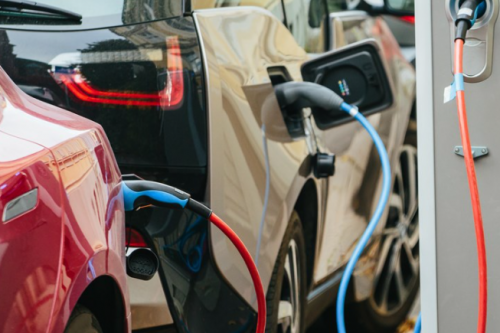Local government officials reveal preparations for an EV revolution

Midlands Connect hosted a panel of local government representatives on Tuesday (March 1), to discuss how local authorities are preparing for an EV revolution.
On the panel were Shamala Evans-Gadgil, the programme manager for Coventry City Council for the rollout of electric vehicle charging infrastructure, Adam Clarke the deputy city mayor and environment and transportation for Leicester City Council, Matthijs Kok from developer Electric Mobility in the city of Utrecht in the Netherlands and Paul Jewell the system development manager for Western Power Distribution.
Chairing the session was Giles Perkins, head of profession and Future Mobility at WSP.
Coventry City Council said it has already installed 468 chargers across the region and by June 2022 there will be 660 chargers in operation.
When asked if there is a risk of disparity between those who can have private chargers installed in their driveways as opposed to those who will have to use public charging points due to no off-street parking, Evans-Gadgil said Coventry has committed to regulating charges through concession contracts.
The council have fixed a tariff for the first two years of a charging point being operational. She also said the tariff will then be aligned to the rest of the West Midlands, and the private operators are unable to increase rates to match London for example.
She said, “regulations will come” but there is a need for a “different model from central government and a collaboration with the public and private sectors to make it a level playing field”.
In Leicester, Clarke said the city needs to level the playing field by balancing social equity.
He added: “On terraced streets, the air quality is likely to be worse and occupants are less likely to be able to afford an electric vehicle and then will have to pay more as there isn’t off-road parking available.
“Many taxi drivers in Leciester live in flat-fronted terraces. Electric vehicle infrastructure could cause a real boom for taxi drivers and add to shared mobility.”
Evans-Gadgil described the need for collaboration across local authorities and the local distribution network operator to facilitate net-zero obligations – in the West Midlands’ case that is Western Power Distribution (WPD).
“You need to understand what capacity there is and what the cost will be, so collaboration is needed right from the beginning,” she said.
Whilst working with WPD, Coventry City Council have installed 39 rapid chargers with 3 to 4 kW which is a ‘hefty’ request for WPD.
WPD says it wants to embrace the move to EV and heat pumps and be on the journey of implementing these to the 7.9m homes and businesses it already supplies power to.
To meet 2030 targets, WPD says it needs to add 2000 low-carbon connections per day, but its current model doesn’t allow for this. Therefore it is trialling what energy is needed at MotoServices at the M5 in Exeter but compressing energy that would supply a small town into shipping containers, due to a need for huge capacity as customers want to charge cars quickly.
Jewell himself is a driver of an EV and says charging it is cheaper than petrol regardless of the increasing cost of electricity. Signing up for a fixed tariff, he said he knows what his electricity cost will be but won’t know what the fluctuating fuel prices will be over the next 18 months.
The goal of WPD however, is to get every player together to make a change.
Jewell said: “There are 130 local authorities to try and work out what their long term goals are.
“We build assets that will still be here in 50 years, so we want to make sure it’s right and not something that will be redundant.”
There are two discussions WPD have had with local authorities, which are; strategic – where the talks outline what the authority wants by 2050 and also tactical discussions – on where authorities want the charging points to be.
Kok, the keynote speaker, echoed the other speakers’ thoughts on how essential collaboration was, especially when looking at forecasts which help local authorities in developing strategies and also for grid operators to plan.
He has helped the city of Utrecht in its development of charging infrastructure based on data.
1150 EV chargers have been installed so far in the 10 years Kok has been working on the project.
With seven members on his team, Kok said: “Cities can manage themselves, but smaller municipalities don’t have the capacity to do so.
“In the Netherlands, this is organised on a regional level with strategic plans and concessions. You cannot expect small local authorities to manage this.”
Charge points in both Coventry and Utrecht are managed by private operators but both Evans-Gadgil and Kok assured that systems are in place to ensure that the cities can still benefit financially.
Leicester however, is in the process of commissioning consultants on its long-term EV plan and is looking into a workplace parking levy.
It has turned its attention to the current issues at hand across the region as the nation starts the switch to EV.
Across Leicester, 50% of households have no off-street parking said Clarke, creating a huge demand for public charging points.
There are also grid capacity issues, range of available vehicles, the cost of creating connection points, lack of equipment, delays with materials, technical skills and knowledge, and the growing pressure of city-centre parking – all of which Leicester City Council say need to be addressed for targets to be met.
In addition, Clarke says as part of the net-zero obligation local authorities have to prepare which causes a huge debate on how to prepare in the community.
He said, “Even a small number of chargers in two communities created residential complaints and concerns, as people felt their space was being taken away from them.”
Clarke advises that local authorities need skills and the ownership of officers in the authority that really understand; where charging points need to be installed, for whom and when.
Coventry’s next steps, however, are to continue with the installation of charging points on off-street parking.
Evans-Gadgil said Coventry, “will add the chargers whether there is demand or not or whether its an affluent area or not,” in an effort to encourage uptake of EVs.









